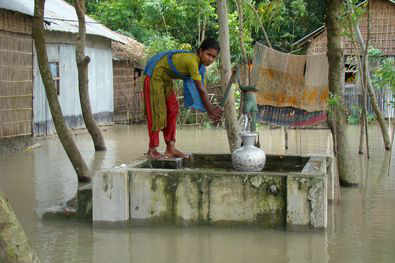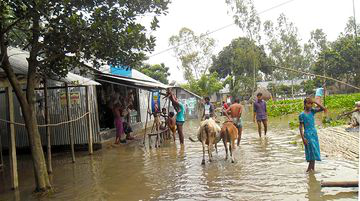Bangladesh and its people is facing the combined threat of monsoon rains and COVID-19. The people hardest hit are those already living in poverty, in communities with high flood risk and limited access to healthcare. Not enough support is available to these communities with disastrous consequences.
Soaring COVID-19 infection rates and limited access to testing
Bangladesh reported its first confirmed COVID-19 cases on 8 March and confirmed the first death on 18 March. The number of Coronavirus cases is fast increasing, particularly after the government has removed lockdown measures in many areas and allowed numerous industries, markets, shops, and transport to reopen.
People are required to wear a mask when outside the home and testing facilities have been scaled up, but tests are still difficult to access. There are 83 testing facilities in a country with a population over 160 million and people in rural communities sometimes have to journey for days to access one.
Coronavirus and monsoon rains
Bangladesh is a low-lying country where the rivers Ganges, Brahmaputra, and Meghna create a deltaic landscape prone to flooding. Along with the sufferings brought by COVID-19, and the lockdown, monsoon rains and ensuing floods started earlier than expected this year. In July it was reported that a third of Bangladesh was under water.
Limited evacuation shelters and the ability for social distancing have become a big challenge. Local leaders and have shared that people are less likely to evacuate to shelters compared to previous years due to the risk of catching COVID-19.
Poverty, hunger, the Coronavirus pandemic, heavy rainfall and flooding, scarcity of food, safe water and sanitation facilities make the situation for vulnerable people seem hopeless. The prolonged floods mean many farmers have lost their crop while homes have been lost to river erosion. Poverty and homelessness increases people’s vulnerability to the pandemic as well as floods.
Practical Action building flood resilience in Bangladesh
Practical Action, as part of the Zurich Flood Resilience Alliance, is working in 4 unions in Faridpur district, one of the flood prone areas of Bangladesh where the rate of Coronavirus infections is particularly high. The programme has worked with eight communities to build resilience against monsoon flooding, for example by constructing flood resilient infrastructure like latrines and raised tube wells. We also focus on building their economic resilience with an understanding that people with more stable finances, and resilient livelihoods will be in a better position to protect themselves from flooding, minimise their losses, and recover sooner.

We have worked with communities to promote goat and poultry rearing on raised platforms which keep the animals safe from being swept away in floods or become ill from, and contribute to, contaminated waters. People can continue to benefit from their animals for food and income during the monsoon season and can recover quicker as the water recedes. Prior to our intervention people lost cattle in floods, or sold them at very low prices leading up to the monsoon for fear of losing them.
Coronavirus undermining resilience gains
The sudden emergence of the Coronavirus has created additional challenges for people in Bangladesh and undermined the resilience built against floods.
Most so called ‘daily wage earners’, people who rather than having secure, salaried employment, work for a daily payment to cover their immediate costs, for example rickshaw drivers or construction workers, have lost their work and income. In the early stage of the Coronavirus pandemic, the value of agricultural products was very low, some farmers were unable to sell their products and lost their capital.
Savings people make to cope with, and recover from, the annual monsoon have been depleted during lockdown as people have been unable to earn an income to pay for food and other necessities.
How can we support people through this multi-hazard challenge?
The Bangladesh Government has tried to provide support to those affected by floods and the Coronavirus, in the form of food relief, cash handouts, and delays in loan repayment. There are strict guidelines on house owners not to pressurize tenants for monthly rent, and the government has provided support for the harvesting of Boro rice which has been purchased directly from farmers.
Many NGOs, including Practical Action, are supporting communities to avoid and reduce COVID-19 infections. Practical Action is disseminating early warning messages to community residents to inform of ways to reduce the risk of spreading the Coronavirus, and how to prepare for floods in the pandemic context.
At the same time our resilient agents, community based volunteers who Practical Action have trained to work within their communities to build flood resilience, are working closely with Union Disaster Management Committees and local government to support awareness programmes and planning of flood response including relief, rescue, and medical assistance.
Despite these efforts support is not adequate, nor does it reach all those trapped in this difficult situation. The complex risk, limited budget, and insufficient distribution (communities we work with report that only 40% of those affected have received support, and what has been delivered is insufficient), creates a difficult environment for response to current, and prevention of future, impacts.

Attend our webinar on Wednesday 9 September 7pm
We still believe joint effective action can mitigate the impacts of, and build resilience to, floods and the Coronavirus pandemic in Bangladesh. Alliance partners Practical Action, Concern Worldwide, and Mercy Corps invite colleagues from local and national government, NGOs and INGOs, and the private sector to a webinar focused on sharing examples of current work, and recommendations for the way forward on Wednesday 9 September at 7pm Bangladesh Standard Time.
Find out more about the webinar and how to access here.
Thank you to our Flood Resilience Field team for researching the content and supporting the production of this blog!

Comments